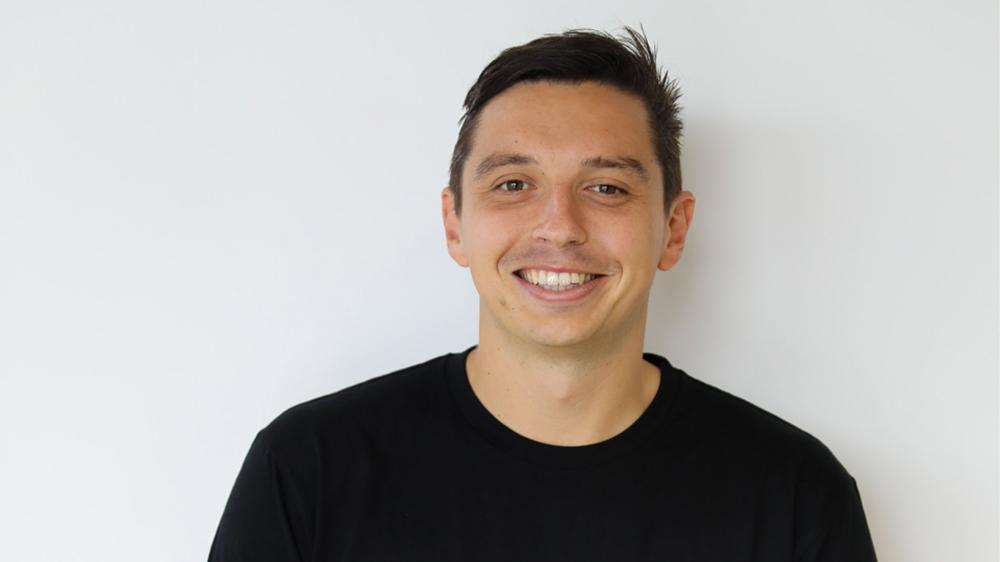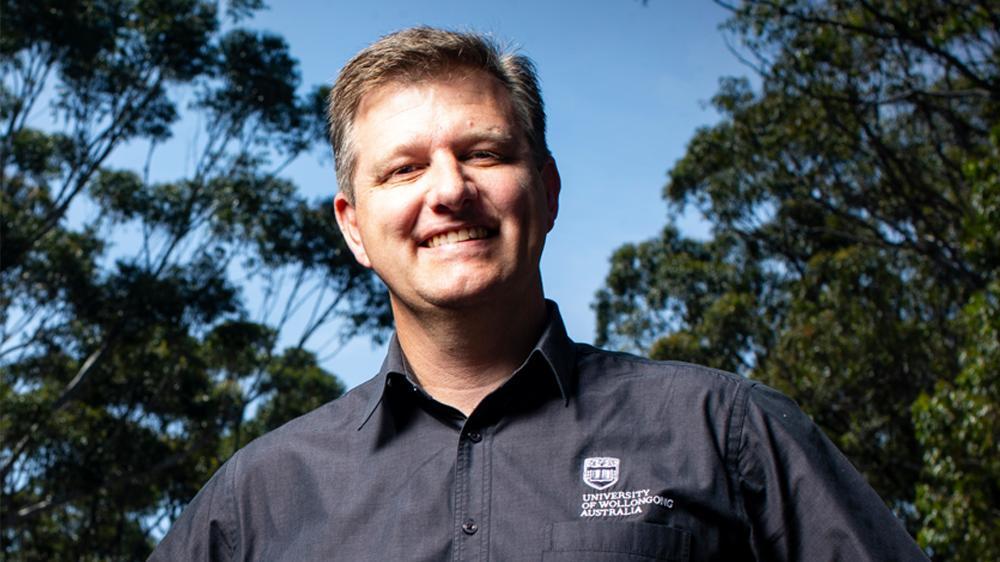August_ The two of us: Duane Robinson and Brendan Banfield
Behind every great PhD candidate is a dedicated supervisor (or two)
June 15, 2021
PhD Candidate Brendan Banfield is passionate about renewable energy and sustainability. His research is investigating how smart technologies in buildings can be used to reduce electricity costs and increase thermal comfort. His supervisor is Duane Robinson who was appointed Deputy Director of the SRBC in 2015, and more recently Director of the APQRC in 2020.
Meet the candidate
Brendan Banfield, PhD Candidate

Brendan Banfield
Can you give a description of the topic or question you are investigating?
My research was investigating how smart technologies in buildings (such as solar PV, batteries, and smart air conditioners) can be used to provide benefits such as reduced electricity costs and increased thermal comfort for building occupants, while also providing support to the greater electricity grid.
Australia has seen rapid uptake in solar PV over the last 10 years, with over 1 in every 5 houses in Australia now having a rooftop PV system. This is the largest amount of solar per capita in the world! While this is fantastic from a sustainability standpoint, the grid was not designed to support this much distributed generation, leading to a host of challenges for electrical distributors who manage the network infrastructure.
As opposed to simply limiting the amount of distributed generation on the grid to avoid these issues, I believe that the key to facilitating the continual increase of renewables in the residential sector is through smart coordination and control. Therefore, I created a control system for the Desert Rose Solar Decathlon House that was able to coordinate solar PV, batteries and the air condition system to minimise the household electricity bill, maximise the building thermal comfort and provide support to the electricity grid in times of need.
How did you select your research topic? Where does your interest in this field come from?
I was always extremely interested by renewable energy technologies in the residential sector, particularly solar PV and batteries. I also understood through years of work experience with Evoenergy (Canberra’s electrical utility) that there was a large gap in understanding of how these technologies will be managed in the future.
During the final semester of my undergraduate thesis, I was discussing with my supervisor A.Prof Phil Ciufo the possibility of undertaking a PhD. I knew if I undertook a PhD, I would want to undertake a topic very relevant to the electricity sector related to solar PV and energy storage on the grid. I also wanted to ensure there was an opportunity for some real engineering design work as well. I love the technical side of engineering, so the opportunity to build and work with real systems within a real electricity network would be ideal.
I remember the day very well in October of 2016 when Phil mentioned UOW was going to compete in another Solar Decathlon and that there were leadership positions available with associated PhD scholarships. I knew then and there that I wanted to pursue a PhD with the Desert Rose house acting as the perfect test bed for my research.
How did you find your supervisor?
Initially my primary supervisor was A.Prof Phil Ciufo who taught me multiple subjects throughout my undergraduate degree and was also my supervisor for my undergraduate thesis. Phil was an outstanding teacher and mentor, with a deep knowledge across multiple facets of electrical engineering. Unfortunately Phil became ill during the first year of my PhD candidature and passed away shortly thereafter. It was an extremely difficult time for not only myself but everyone throughout the University that knew Phil.
I was fortunate enough to have another excellent supervisor in A.Prof Duane Robinson who taught me one of my favourite subjects, Renewable and Embedded Generation during my fourth year of uni. Duane was also an Academic Supervisor for the Solar Decathlon so he wasn’t too harsh on me when I was spending all my time building the Desert Rose house as opposed to writing research papers!
How do you think your research can change the world?
I am hoping my research can assist in facilitating the growing number of distributed energy resources (DERs) such as solar PV and batteries throughout electrical networks. I believe the future electrical network will be decentralised, with most buildings having their own mechanism of generating and storing renewable energy locally. However, to achieve this, significant change must take place to coordinate these thousands of resources while ensuring the network remains as safe and reliable as we are accustomed to currently.
To facilitate this transition, in 2020 I founded a start-up Gridsight where we are focused on using data from smart meters among other sources to provide electrical utilities greater visibility over these DERs and their network as a whole. This visibility allows them to understand where network constraints are and how they can be reduced, ultimately allowing more renewable energy technologies to be installed on the grid. It has been an exciting journey so far, coming through iAccelerate we are now working with utilities not only in Australia but New Zealand as well.
What advice would you give someone considering doing postgraduate studies?
My biggest piece of advice would be to research something you are passionate about. If you are truly interested in your area of research, it will make the experience of undertaking a PhD much more enjoyable. My other piece of advice would be to gain further experience outside your PhD. I was fortunate enough to be part of the Solar Decathlon which allowed me to build a house, learn a host of new skills, work in a great team and travel across the world. It is these experiences that truly enrich postgraduate studies and will provide skills beyond just research that you can use throughout your career.
Meet the supervisor
Associate Professor Duane Robinson

Associate Professor Duane Robinson
Can you explain your area of expertise?
My main research area is power quality within electricity distribution systems. This is essentially finding methods to ensure that the electricity system delivers supply in such a way to guarantee that all connected equipment, from your hot water kettle to large industrial plants, can operate correctly. As Brendan has mentioned, power quality can be affected by connected equipment, network operation, external or weather events, and new technologies which the electricity network was not necessarily designed to cater for, such as high penetrations of solar photovoltaics.
I have worked with both the Australian Power Quality and Reliability Centre and the Sustainable Buildings Research Centre over the last 10 years within the Faculty of Engineering and Information Science, so all things energy, electricity and energy efficiency within buildings or the electricity network covers my other areas of interest. This has included being part of the team setting up and operating various components of the net zero energy facility on Innovation Campus, and being involved with the University’s Solar Decathlon campaigns.
I enjoy teaching people about the operation and technical details of electricity distribution networks, and that is where most of my undergraduate, postgraduate, and engineering professionals training has focused.
How did you find yourself where you are now professionally?
I have not really sought professional advancement via any structured or planned path, but have taken opportunities as they arose. After moving from a small township in South Western NSW, I began my career in heavy industry working for BHP Steel as a cadet, and I was similar to Brendan in that I found good mentors within industry and the University of Wollongong who inspired me to work hard on the things that I enjoyed. An Endeavour Energy (then Integral Energy) project funded scholarship at the end of my cadetship attracted me to postgraduate studies, and a short stint as an academic at the University of Wollongong soon followed.
I returned to industry and worked on a number of large scale projects for an engineering consultancy, which ended up renting office space on Innovation Campus. From there, my journey back into academia began through a collaboration of the above mentioned research centres. Working within the Sustainable Buildings Research Centre obviously provided much inspiration for my research, and teaching, in energy efficiency, renewable energy, and demand management.
More recently I was asked by the Faculty to take over the reins from one of my long-time academic mentors who was retiring from the University and their role as Director of the Australian Power Quality and Reliability Centre. And that is where I find myself today.
What makes a great PhD candidate?
I do not know if there are great candidates as such. It is more about being at the right point of your life to pursue such a thing, and then finding something and someone to keep you inspired through to completion. This is not always easy. I have found that those students who have prospered through the journey have all been working on projects which align with what they want to do in the future.
Having some industry experience is a good thing for PhD candidates. I believe it provides some initial higher level thinking to a long-term project like a PhD, although that can also be developed as part of the process. If a project is complimented with industry or social relevance, or direct inputs from industry or community partners, than I think that often makes for a better project as well.
I have a great deal of admiration for those candidates who did it better than I did, and Brendan is one of those. It was a pleasure to be part of Brendan’s undergraduate and postgraduate education, and of course to work together on the ‘Desert Rose’ Solar Decathlon house with the rest of Team UOW. Brendan’s PhD project was also supported financially by one of our electricity distribution partners, ensuring industry relevance, and we hope to work together collaboratively with Brendan’s new start-up company and other industry partners in the near future.
How do you guide candidates on their journey?
The first step is to be realistic about what it takes to do a PhD, and what it is that a candidate wishes to get out of undertaking their research. Doing a PhD should be an enriching experience, where robust discussion with their supervision team and colleagues is encouraged, and also involves candidates challenging themselves. At some point in their studies, candidates need to be encouraged to lead the way.
A PhD is a long journey, and there are always distractions along the way. I remembering warning Brendan about the workload of being a student leader in a Solar Decathlon, having already supervised and worked closely with other solar decathletes. But Brendan could see the opportunity, and in the end, while it partially delayed the thesis, it also enhanced it.
What should candidates consider when finding a supervisor?
Honesty is key to the relationship. It is good to find someone that is expert in their area and will push you hard to get things done, but you also need to be able to ask questions, express when you are having difficulties, and discuss life in general at times of need. Candidates who already know their supervisors through undergraduate or postgraduate activities, industry projects, or those who have completed complimentary research already, have a significant advantage in finding somewhat suitable for them personally.
To learn more about our researchers take a look at their profiles
Associate Professor Duane Robinson
Faculty of Engineering and Informations Sciences